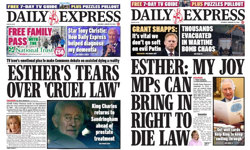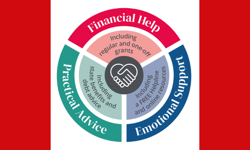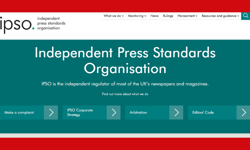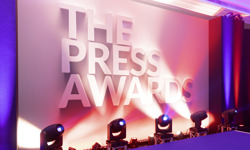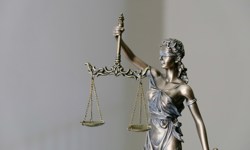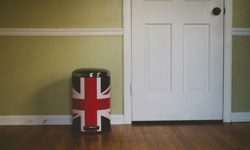Bob Satchwell’s lecture:
Good evening.
Perhaps I should have known better. We were in a wine bar – next door to St Bride’s own wine cellar downstairs – and even in the generous and enjoyable company of David Meara and James Irving, there is no such thing as a free lunch.
Over a gentle glass of wine in response to their thoughts on who might deliver this year’s Olsen lecture against a background of the biggest controversy involving the media for decades, I seemed to be saying “yes ... but” every time a name came up.
There were plenty of better names who would have been far more capable of entertaining you this evening. But at that time, at the height of the fever, views seemed to become more polarised by the day; some might have found it difficult to argue a neutral case when it was perhaps best that St Bride’s should not be either tarnished or celebrated for seeming to favour one view or another. Indeed, at that moment, some candidates might have found it difficult to say anything meaningful for fear of compromising one of the many inquiries that were being established.
That’s how I was seduced into appearing before you. It was difficult to duck the challenge so I am here a little reluctantly to say something that has some relevance to the memory of a distinguished Fleet Street professional who for 15 years had arduous duties as wine correspondent of the Sunday Telegraph.
I am mightily honoured to be following the likes of Lord McGregor of Durris who as the first chairman of the Press Complaints Commission delivered the inaugural Olsen lecture in 1991 on the subject of “A free press in a Free Society”. Others have included Sir David Attenborough, P D James and Matthew Parris, ballroom-dancer Anne Widecombe and cake maker Jane Asher
– all real entertainers – along with Andrew Marr who in 2005 posed the question: “Hacks and politicians – are they destined to sink together?” . . . . From McGregor through to Marr, in 2011, is there nothing new?
What’s more, how might I dare to stand in the shadow of so many greats? Well, I used come to this splendid church for sanctuary on occasions when I was working around the corner in Bouverie Street at the News of the World. It was then, as now, a place for quiet reflection. It probably said more about perceptions of me than the church of Fleet Street that I can only recall one time when anyone thought to look for me hiding here rather than in one of the neighbourhood’s other, busier hostelries.
Those were the days when a new editor of the Sun found it appropriate to put out a memo declaring that lunch hours – were just that, and so starting the conversion of Fleet Street from a minimum of three hours in the pub to a bottle of mineral water at your desk. We owe Kelvin a lot!
I have always admired how St Bride’s earned and maintains its reputation as the journalist’s church even after most of the press is long gone. It does not ask questions of journalists and certainly does not pass judgements. It raises a very special voice on behalf of journalists especially when they are in danger or under threat - and don’t we need it?
Then as now, before I ran for the relative peace of Cambridge to edit the Evening News, Fleet Street and especially those parts of it that were, and remain, the most popular with readers, were coming under siege from politicians, others in the establishment that believed they knew best, and indeed from other parts of the media – again what’s new?
But before I pontificate on current issues indulge me as I share just three stories with you.
Back in the seventies 11-plus still ruled education across most of the country. At the school in a tiny Lancashire village, nine boys and girls passed for grammar school. Sadly that was six too many for the bureaucrats’ quota. Incredibly, the children were made to sit the discredited exam for a second time and, this time, only three passed, that was the quota for that village.
I had a source – who had to be persuaded to blow the whistle – and managed to interview all the distraught but reluctant parents. It made the splash and an inside spread. After a couple of months’ campaigning the education authorities thought again. Six out of the nine were allowed grammar school places. A partial victory.
That happened in my first year in journalism. I didn’t know it then but it would now be called “investigative” journalism.
Strictly speaking it wasn’t even approved. The news editor had too many diary jobs to cover to indulge a raw recruit in such heady stuff. I broke the story on my days off or after sitting in court all day - Sound familiar?
The second was about a police chief who ordered detectives to let his cronies’ relatives out when they had been arrested for firearms offences, took favours from local traders, fiddled his expenses and used police cars for errands. He was also close to a lot of dodgy businessmen and politicians.
I had another reluctant whistleblower and quite a few junior cops only too willing to help with inquiries. That made a splash and five inside pages. Months of follow-ups made him the last chief constable to be sacked.
The third happened when I was at the News of the World. An elderly lady found my direct line and phoned to tell me how she was struck by a bolt of lightning every time she went out of the back door. I humoured her of course but this was pre Mazza days, so I concluded that it was highly unlikely that our team of intrepid investigators would be able to help her. After several months her pleas became more urgent and infuriated. So I sent a local correspondent to her door in deepest Essex.
Within hours he was back on the phone. “You are not going to believe this,” he said . . . . . and YOU might not when I reveal all later . . .
I shall return to these great exclusives. In the meantime, I wonder if, five years down the line, we will believe what has happened since July 4, 2011?
In case you can’t remember, that was Milly Day, the day, just four days before the Secretary of State for Culture, Media and Sport was expected to allow Rupert Murdoch to proceed with his bid for the rest of the BSkyB shares he did not already own. It was revealed that the late Milly Dowler’s mobile had been hacked while the police were searching for the tragic teenager.
It was a curious coincidence given the storm that was about to be unleashed on a parliament and nation drifting towards the summer holidays, that it was Independence Day in the United States - that collection of former colonies where, a century after England won its Bill of Rights, the rebel regime found it necessary to take our 1689 step towards a free society a pace further by enshrining in their gleaming new constitution a first amendment guaranteeing the freedom of the press.
We have grown used to fiction portraying journalists as bad, mad and sad. News broadcasters and the posher papers have sometimes been more than willing to perpetuate the image of the grubbier end of Fleet Street. But this was something different.
The whirlwind this time threatened to engulf us all and, as we have seen more recently, gave the police confidence to threaten even one of the hands that has fed their investigations with the dire consequences of the Official Secrets Act.
Sitting behind the mighty title of the Society of Editors, I have felt a tad beleaguered at times during these past three months. In July, and still in some circles now, it was certainly unfashionable to dare to suggest even at a whisper that there might be other aspects to the story.
As parliament raged, the Prime Minister set the tone in decreeing by implication at least that all the press was evil, the Press Complaints Commission had to be abolished, journalists should never dare to speak to a police officer or politician ever again, media proprietors were dangerous devils.
That was even before he had announced the most serious of the many inquiries into not just Hackgate, but journalists’ ethics and behavior, their relationships with others in society, indeed, it seemed, whether we should exist at all.
It was not sufficient for committees of the House of Commons and the House of Lords or the new and bigger police inquiry already started last January, to do their work and examine the evidence leading to this Soddom and Gomorra moment.
What a contrast with last month when secret papers discovered in Libya appeared to suggest that our spies and therefore the British government were implicated in illegal rendition of terrorist suspects and sending them to be tortured. Oh no, the PM told the Commons, we must not jump to conclusions about pieces of official paper liberated from an embassy residence. A much less powerful inquiry could quietly deal with that . . . no need to shake that part of the community to its roots. There were few cries of foul this time, but the Opposition had not long ago been in government, of course.
But back to the firestorm that was hackgate. Somehow I expect the editor of the Wee County News up in Scotland is still wondering what the fuss is about and why fellow editors miles from the Westminster village should take notice. Equally, other Society of Editors members, including those in national newspapers and broadcasting, are entitled to ask why?
You might also appreciate that representing the interests of a cadre of more than 400 editors, media lawyers and journalism trainers from all sectors of the media is not the simplest of tasks. They are more than capable of speaking for themselves but at times someone has to provide a view from inside the barricades.
Let me say from the outset that neither I nor the Society of Editors seek to defend phone hacking. It is illegal and therefore has no part in journalism except in the most unusual circumstances when there just might be a public interest justification. Those circumstances are difficult to imagine until the occasion arises but who knows?
It is also important to remember that while there has been something of a siege mentally since July 4, editors are beginning to join the debate. They are certainly not hiding either their views or their acceptance that some things may well have to change. Check out the line-up of contributors to the all-day debate at our conference in November.
And also look at the title for the conference – Magna Carta II – a modern media charter. The title and the venue were chosen long before hackgate reached fever pitch. Runnymede is hard by the Thames near where, in 1215, King John started the process of sharing powers and rights that until then were the preserve of kings,
I have not yet been asked to replace Mystic Meg but there was a serious motive behind those choices. Despite welcome moves to reform libel law and especially contingency fee arrangements that have seriously deterred journalism in all its guises and at every level, the pace is slow. In 2010 a Society report had concluded that Harry Evans’ half free press was now only 45 per cent free. Even before July there were siren voices advocating powers to trim the activities of the media. There always have been but they were growing louder and have now had cause to reach a crescendo that ignited the public too.
When some of the beasts are all but on their knees, it seemed to the hunters an opportunity not to be missed. But at a time when every part of the media faces real and serious economic challenges this is doubly difficult for the public as well as publishing and broadcasting.
With the benefit of high and understandable emotion about Milly Dowler the vultures gathered to misinform, mislead and, above all, baffle the public and suggest that weakened, subdued, even controlled newspapers would be good for them.
I say tell that to the French, let alone the people of Zimbabwe. The French appeared genuinely shocked by revelations about Dominique Strauss Kahn. So much for a media that thinks there is never justification for straying into private lives or that it is fine for politicians to mislead the people who elect them and pay taxes for them to squander.
But lest you think I excuse law breaking or bad behaviour in the media let me make this absolutely clear:
It is perfectly acceptable and indeed proper for one part of the media to hold to account another part of the media. That is the value of a free and competitive press.
It is certainly valid for politicians, competitors, concerned and informed members of the public to question and indeed try to undermine one company’s apparent dominance of the media.
It is reasonable in the hurly burly of adversarial politics for members of Her Majesty’s Opposition, official or otherwise, to seek to embarrass a Prime Minister about his recruitment policies and the company he keeps.
It is understandable, but not necessarily right, that the political classes who have been battered and severely bruised by media inquiries and reporting might want to kick back. - It’s good to know they may be human!
And while it is hard to admit it, even morally bankrupt film stars, politicians and other notables exposed for their double standards and overbearing desire to protect their public images, have the right to question and criticise the press. That is their freedom of expression. The joke is that while they may win the day and tidy sums through the legal system, the court of public opinion usually dispenses better justice. That’s why these people are so keen to keep their peccadilloes and hypocrisy out of the papers. You might also ask what makes them think we should take any lectures from them about ethics, personal or corporate.
This is the real story behind this past summer of discontent. Phone hacking was a symptom of a bigger issue – a star to which our critics hitched their wagon.
Although we still await the precise evidence of the scale of the problem and the nature of any cover up or failings in the police or the press, hacking was not practiced or condoned by the vast majority of journalists or their employers. There are plenty of allegations but so far no court has tested them.
The original much–criticised police inquiry that sent two people to jail had the unsurprising outcome of stopping the crime several years ago – unless you know better. After that any journalist who carried on hacking would have deserved to be locked up somewhere safe, by men in white coats, let alone in jail. Similarly, concerns raised by the information commissioner about breaches of the Data Protection Act on behalf of the media, were dealt with by newspapers to the commissioner’s satisfaction.
Self - regulation has largely been blamed for the debacle – even though it was a failure of the police and the investigatory powers of the legal system, not to mention the special powers of the Prime Minister’s office – rather than the PCC.
I do not seek to excuse failures within the press but the media has become the most inquired into institution of public life in history. In fiction we simply would not believe the number of investigations currently underway. Indeed there are inquiries into the inquiries. I am simply asking did so many need to take place?
It will be for others, hopefully after serious and careful thought, to make recommendations but whatever their force it will remain a matter for the industry and journalists to implement changes in behaviour that are needed. While the PCC is criticised for lacking teeth or sanctions it must be remembered that the Editors’ Code which is the basis of its judgments, is written into the contracts of employment of nearly all journalists, their news editors and their editors. Is there a more powerful sanction than the sack or will a reincarnated PCC be issued with thumb screws to help them go where the police could not?
Of course self-regulation can be improved. But there must be provisos. It must be the industry’s system not one imposed by the whims and vested interests of politicians, lawyers or discredited actors.
And, crucially, against a background of serious financial challenge, who will pay for this great new edifice of regulation?
If journalists and their publications became “licensed” even in what might appear to be a benign form, that would be a serious and dangerous infringement of freedom of expression. If pubic money is expended on a new system it will not come without strings and, however well intentioned, it will be the first step to censorship and state control. Don’t let anyone persuade us to start down this dark tunnel.
We may never know if it was conspiracy or cock-up that caused serious misbehaviour that now threatens the fabric of the media as a whole. The consequences have already been dire. News Corp has lost its bid, top policemen have resigned and, love it or loath it, the News of the World has been sacrificed along with its proud history of exposing wrong doing that goes back long before many other papers thought of investigating or campaigning on behalf of their readers.
The reputation of journalism in the UK has been tarnished unjustifiably. Ironically even the dogged investigative journalism of the Guardian was threatened, as we have seen, until the whole of the media joined with one voice to condemn the Metropolitan Police.
The debate about media ownership and plurality will continue but the media cannot be blamed for perceptions of the power of one company or more precisely one man. There is also the danger that the economics of the industry may not be able to withstand new limitations or control. Some papers – and other parts of the media - struggle to survive when they are relatively free of constraints.
Approve of Rupert or not, he did save the News of the World in 1969, transformed the Sun, subsidised Times Newspapers and created a top class satellite broadcaster with a top rate subsidised news service. That is no excuse for what happened at Wapping but one of the key issues is who else might follow that example if, in effect, success means a proprietor has to divest himself of part of his empire.
In Britain a free press has been a commercial press as opposed to one subsidised by government, lobby groups or trade unions. The editor of a commercial newspaper carrying a wide variety of ads cannot be influenced by any one reader or a single advertiser, although the danger of the latter is always there. Over the years those papers with a single proprietor or a dominant chief executive have tended to fare best. As we see now those with powerful shareholders – as opposed to owners with big shareholdings – can be starved of investment in journalism in the pursuit of share value. That is a danger in itself.
Let us hope that the inquiries also examine the collective guilt of politicians who now say they were over-influenced by one man!
If they don’t, can the fragile belief in freedom of expression, the public’s right to know and the media freedom that follows be maintained without the safety valve of a USA-style First Amendment to a written constitution?
Carl Berstein, one of the two Watergate heroes speaking at a Guardian event last week said he was horrified by the idea of introducing stiffer press regulation, arguing that the press needed to be regulated in the same way as every other person's speech is - through general law.
Well said, but he had some scathing remarks about the UK press suggesting that the scandal helped “drive the ever descending lowest common denominator of journalism that resulted in a diminution of reporting standards" .
Maybe, but freedom of expression and America’s First Amendment means the papers of which we disapprove must be as free as those which we applaud. Freedom has to be warts and all, papers must be free to be biased, to get it wrong and be irresponsible in our eyes – but we hope they won’t be, of course.
I am sometimes accused of defending the indefensible. While it may sometimes be difficult to justify what the papers do, their right to do it within the law, and the concept of a free press is never indefensible.
These are the concerns that make the Society of Editors determined to fulfill its essential role as a defender of the media on every level. We accept justifiable criticism but we remind politicians and the public that despite its faults and its occasional indiscretions the British media has a long and proud record.
It fights for those who have a right to know what is being done – and spent – in their name and those most in need of protection from overbearing bureaucracy, flawed government, the rich and powerful, and from arrogant hypocrites.
That is the message that I belief all our members support.
And before I conclude, let me return to those stories I described earlier.
First, the chief constable. No money changed hands but he would not have been exposed without the help of those close, trusted contacts, some at very senior level, that are only cultivated over months and years of lunches, dinners and other socialising which an indignant House of Commons apparently put off limits during the furore back in July.
And what was the first reaction of the authorities way back then? . . . They wanted to use the Official Secrets Act to find my source. As we know from recent experience, they never learn.
As for the little old lady and her thunderbolts, our intrepid agency reporter sat her down with a cup of tea before inspecting the back door where lightning was supposed to strike. When he ventured out no-one was more surprised that he that he was struck by a flashing thunderbolt too!
No it was not a voice from above. A dodgy and bankrupt builder had failed to adequately protect an electricity cable so whenever anyone stood on a grating by the back door, they got a rather nasty shock. The paper had the problem sorted out by another builder as a little reader’s service.
Let’s hope Lord Justice Leveson appreciates that the facts are sometimes stranger than fiction, and that cock-ups are more common than conspiracies.
And finally, the children who had to jump extra hurdles on the way to grammar school.
I had long forgotten that story until ten years later a letter arrived from one of the girls. “Dear Mr Satchwell,” she wrote, “without you I would not have gone to grammar school, so I probably would not have gone to university. I thought you would like to know I have just been awarded a first class honours degree – thank you.”
The thought of that letter still brings a tear to my eye but, more important, when people ask how we will ever rebuild public trust in the media, there can only be one answer:
This was a tale of innocent children and self satisfied bureaucrats. With youthful zeal I had unwittingly followed that dusty adage that journalism is about comforting the afflicted and afflicting the comfortable.
And the lesson is that it is wrong to try to interfere and make that task more difficult. Anyone who does will never overcome determined journalism . . . but it would be bad news for the media, but more important . . . it would betray the public.
Thank you for listening.


